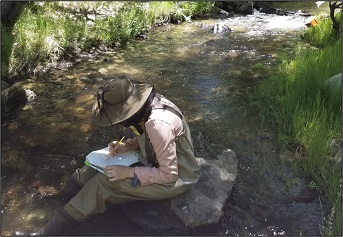Interactive mapping tool to help managers ID causes of poor stream condition

SCCWRP and its partners are wrapping up production of an initial version of a user-friendly, web-based management tool for helping stream managers rapidly narrow down likely causes of poor stream condition.
The Rapid Screening Causal Assessment (RSCA) tool, which is expected to be available in alpha form in late November, is intended to speed up the traditionally time-consuming process of analyzing site-specific stream bioassessment data to pinpoint which types of stressors are likely responsible for degraded biological condition.
Stream managers in California increasingly are being required under their wastewater and stormwater discharge permits to investigate likely causes of poor stream condition. These causal assessment analyses, which can take six months or more, traditionally have required specialized training to analyze and interpret bioassessment scores generated through the California Stream Condition Index (CSCI) and Algal Stream Condition Index (ASCI) scoring tools.
The RSCA tool standardizes and automates labor-intensive stream causal assessment analyses, displaying site-specific insights on an interactive, point-and-click mapping dashboard. The RSCA tool also provides a high-level overview of major causes of stress across watershed-scale areas.
Using the RSCA, stream managers can rapidly rule out unlikely causes of stream degradation. Simultaneously, the RSCA can help managers understand which stressors are most likely to threaten biologically healthy streams, enabling managers to take informed actions to protect these streams. The RSCA tool also provides feedback to managers on data gaps in their monitoring programs and recommendations for future additions.
The RSCA tool represents an expansion of existing SCCWRP-developed web tools designed to help managers understand the major causes of impairment to stream health. The RSCA is designed to be used in tandem with the:
- Stream Classification and Priority Explorer (SCAPE), which predicts the degree to which stream biointegrity scores are likely to be limited, or “constrained,” by urban and agricultural development
- Stream Quality Index (SQI), which places bioassessment data side by side with chemistry and physical habitat data to offer context to stream managers investigating causes of low stream bioassessment scores
Unlike the SCAPE and SQI tools, the RSCA tool will provide more in-depth causal assessment analyses that consider a wider range of stressor types that commonly impair the health of Southern California streams. The RSCA also will explicitly link the biology (i.e., SCAPE) and stressors (i.e., SQI, in part) at a site together.
Four potential causes of biological impairment will be initially evaluated via the RSCA tool: altered habitat, altered water temperature, elevated conductivity, and eutrophication. Three additional types of stressors – altered flows, invasive taxa and sediment toxics – will be added in the near future.
The RSCA tool is envisioned to support the first tier of a three-tiered causal assessment framework for efficiently determining why bioassessment scores are low at a given stream site. After the rapid screening-level tier would come a detailed causal assessment, followed by a confirmatory causal assessment.
SCCWRP developed the proposed causal assessment framework after evaluating the utility of a stream causal assessment framework known as the Causal Analysis/Diagnosis Decision Information System (CADDIS) developed by the U.S. Environmental Protection Agency. During the CADDIS evaluation, which consisted of four case studies published in 2015, SCCWRP and its partners determined that the CADDIS framework would need to be modified for application in California.
The RSCA tool is initially being developed for the San Gabriel River watershed, but will eventually be adapted for use across California. A publicly accessible beta version of the RSCA tool is expected to be released next spring.
For more information, contact Dr. David Gillett.
More news related to: Bioassessment, Indices of Biotic Integrity, Top News